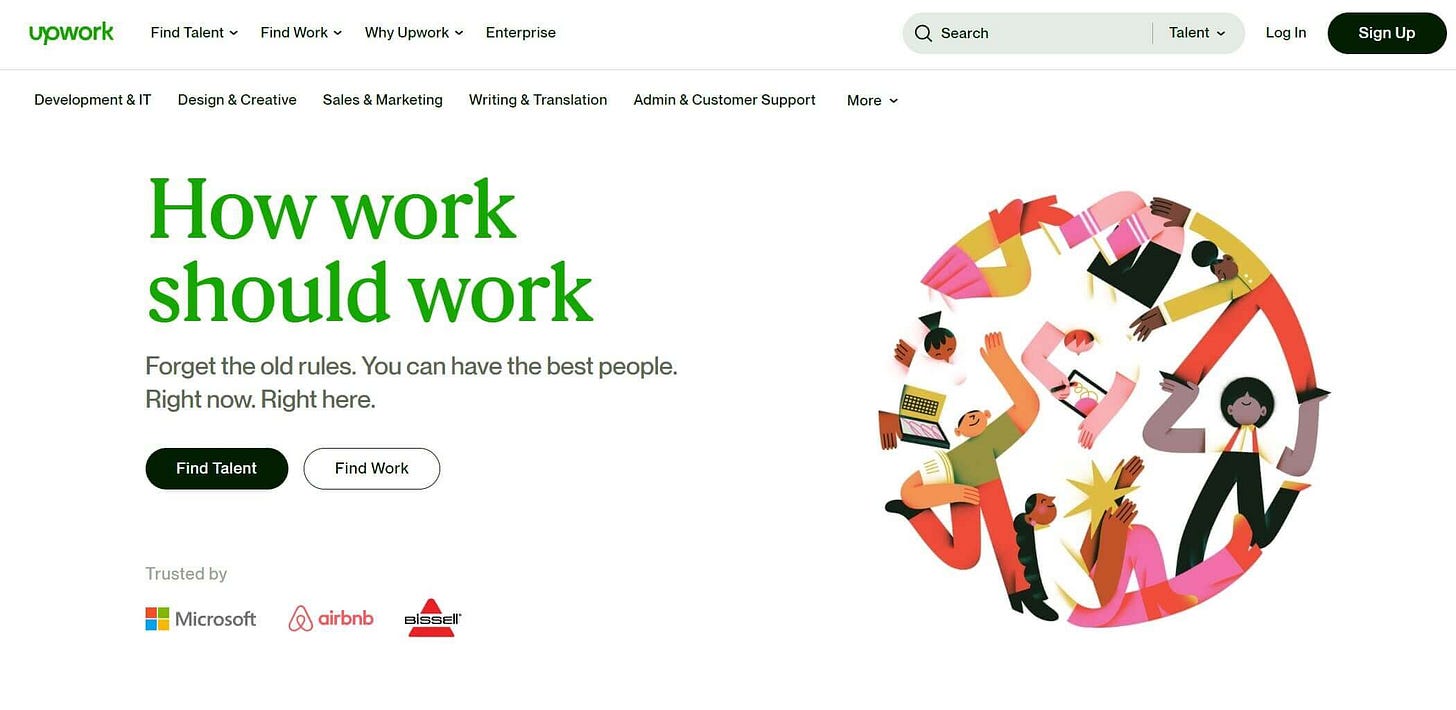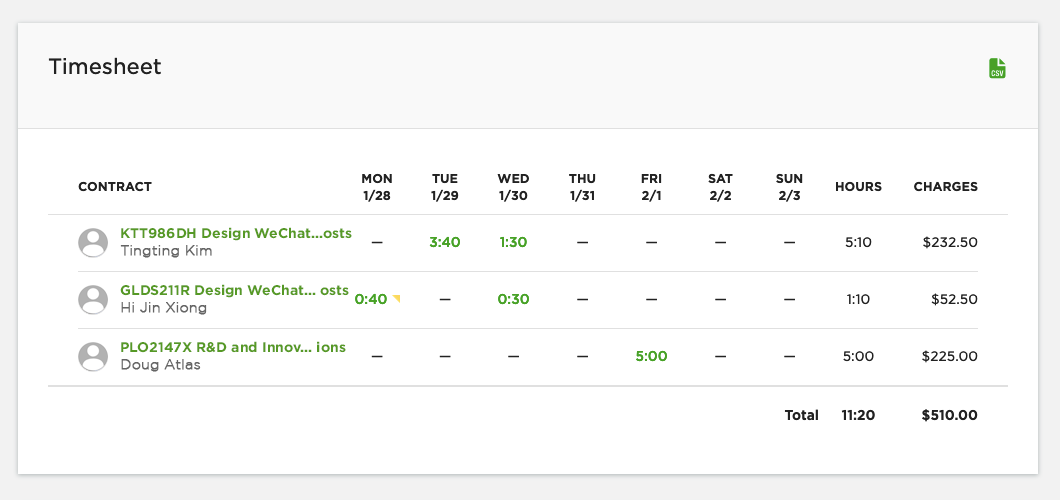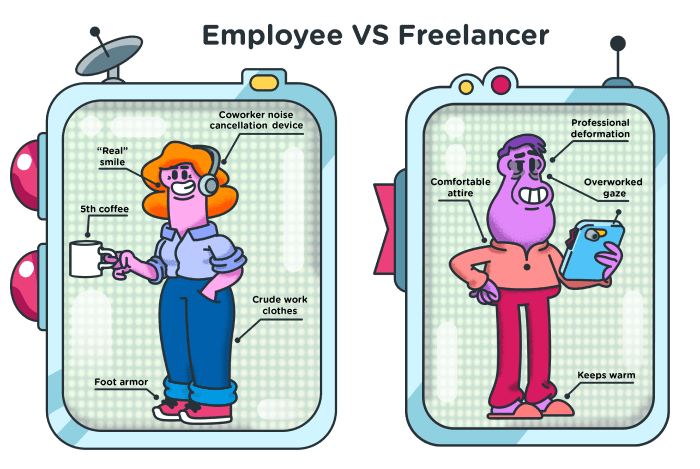My 'Mini-Bible' on building tech using folks from upwork
This is based on hiring over 100+ freelancers from Upwork and Fiverr over the last 3 years for things like engineering, design, QA, etc.
I’ve posted before about the fact that I’ve been using folks from Upwork and Fiverr for almost three years now. And typically employ them for client engagements or for one of my two side hustle startups.
In total i’d say i’ve used well over 100 Upwork & Fiverr folks to do things like:
Development (eg. Magento, Shopify, Bubble)
Design (site design, landing pages, etc)
QA
Customer service and operational support
SEO
Creative services (videos for youtube, thumbnails, etc)
I find working with Upwork folks to be amazing
Why do I say this? Is it because they are all brilliant and great?
No, of course not. Haha
In fact many of them actually suck.
But if you are good at weeding out who is good vs. bad quickly… you get amazing value for your money.
Because unlike normal employees:
You can turn them on and off like a faucet. For example in Upwork i typically just set a cap on the number of hours that they can work in a week.
They are very responsive… in part because they need you to give them a good review. Why? Because reviews are key to whether they get future customers.
There is no problem in trying them out and then keeping only the ones you want.
And generally they are less expensive because they are often based in places like Pakistan.
I find its important to have a process when working with them
What I mean is that you need a process for things like interviewing, onboarding, how they work, etc.
And so i’ll give you an example of my process:
Step 1: I write a job description post on Upwork (often using AI) and get a bunch of applicants
Step 2: I write a standard message to the ones that I like that says something like “Hi, i’d love to chat. Here is my Calendly. Please book a time this week”
Step 3: I talk to around 10+ of them. The goal for me is to have at least 3-5 of them start.
Because if for example I have 5 of them start… then this will likely end up in me liking perhaps 2 of them. And will let the rest go in a few weeks.
I generally find my ratio of folks that i keep to be about 30-40% of the folks that i work with.
Step 4: I onboard them systematically
I add them to Clickup and give them access to the right folders
I create a clickup card for their onboarding and use an automated template that has a checklist of items
Another person in my team than goes thru the checklist and gives them access to things like Notion, Slack and invites them to our daily standup
Step 5: I work with them systematically
I ask them to look thru our team’s kanban & Notion to get a feel for what we are building and where we are at. All cards are written in a way that is simple to understand.
Everything they need to do is assigned as a clickup card with a clear description of what to do & a status ‘prioritised’ which means they should work on it.
They update what they do as comments on their clickup cards and also tag me when they get blocked.
They join our daily standup for 10-15 minutes and give an update and align on any questions they have.
Step 6: They clock their time to tickets and to upwork
Clickup allows them to manually clock their time to tickets they work on
I have a Clickup dashboard that shows how much time they put in clickup at the end of the week.
I sometimes check specific tickets and comment if i think they spent too much time. This kinda lets them know… that they shouldn’t try to exploit me.
I then check the weekly total hours in clickup vs. what they put in upwork to ensure they align. Usually its fine.. but sometimes folks will try to slip some extra time in.
And voila! You have a very easy system to maintain.
Upworkers vs. In-house tech team
A lot of folks i meet are skeptical about Upwork and Fiverr folks… and this is in part because either they or someone they know had a bad experience.
Which is completely normal. And its why I have the process I mention above.
But the question I challenge them with is…. why do you think your in-house team is better? And they start to list things like:
employees have more commitment
employees are more reliable
employees are smarter
And I have to be honest that having used in-house employees and managed probably 200+ people over my 20+ year career… I would have to disagree.
When I managed teams I was generally happy if 50-60% of my team were at the bar that i’d ideally want to set. Because you always make bad hires and you need to be humane when you do, and give them a chance to improve.
This is not the case with Upwork folks. I can pause their hours immediately. And so generally I shoot for 80-100% of my team to be at the bar that I expect.
Of course they are not at the same level as folks when I studied at Cornell or worked as a consultant at BCG. But at the level of some of the folks that I worked with at places like Pomelo Fashion and Lazada? For sure.
Wanna talk about working with freelancers from Upwork and Fiverr?
Join the Picnik group: Working with freelancers from Upwork and Fiverr
What is Picnik?
Picnik sets up 1-1 calls between folks that join the group that can last between 10 - 30 minutes (length is up to you). And right now each person gets 1 meeting per week.
And so you get engaging conversations and meet interesting people that have some of the same interests as you.
And the great part is.. it’s free!
Plus…. i’ll also be doing some calls, so maybe we’ll end up chatting! What can be better than that! haha
Hopefully chat with you soon!








This is a great post to give us a template of how to think about hiring people for my eCommerce Startup for tasks we know can be tightly defined and then assigned out.
The full time hires only really benefit a firm when you either want them to own pieces of longer term strategy or have enough work for them where you feel like a full time person might end up costing you less or working with you better.